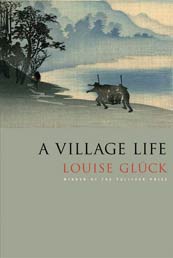.jpg) Each day leading up to the March 11 announcement of the 2009 NBCC award winners, Critical Mass highlights one of the thirty finalists. Today, NBCC board member Maureen McLane discusses poetry finalist Louise Glück's A Village Life (FSG).
Each day leading up to the March 11 announcement of the 2009 NBCC award winners, Critical Mass highlights one of the thirty finalists. Today, NBCC board member Maureen McLane discusses poetry finalist Louise Glück's A Village Life (FSG).
Louise Glück has written, in A Village Life, an extremely strange, mesmerizing, and profound work. Her eleventh book of poems, A Village Life is a suite of lyric meditations voiced by a host of unnamed yet precisely stationed speakers: a daughter reckoning with her parents’ etiolated marriage; a woman remembering adolescent gatherings and fumblings in the park (“We sat at the river discussing parents in general/and sex in particular”); a man who considers admiringly and exasperatedly a dear friend who plows through lady friend after lady friend (“My friend falls in love a little too easily . . . /If they have children he doesn’t mind–/he can fall in love with children also”); another man who, having moved his family to the city, reckons with his wife’s ongoing longing for the village (“She remembers picking the olives, who made the best brine.”) We encounter a cumulatively choral and implicit “we” who chart the ebb and flow of seasons, passions, ages. We find ourselves in a kind of reconstituted, disabused, mature pastoral, vaguely Italian, deeply civilized, rooted in yet often chafing against routine.
Glück is now writing dramatic monologues without markedly dramatic personae: she has devised an astonishing method for capturing a kind of collective, etched experience—how one learns of sex, how marriages flow, how migration informs memory, how friendship, parenthood, aging, and memory might be sounded out, registered, explored. It is as if she is writing a novel by other means—without the distracting apparatus of “then this happened, then that”: we get the telling exchange, the diagnostic scene, the ironical aside, the ruminative coda. It is as if Glück is writing simultaneously an elegy and a commemoration of our simultaneously shared yet singular life.
Glück has always had a certain scene-making flair and tonal command. The apparent deadpan, so frequently funny and sharp in her previous books, is here mellowed into a kind of bemused, assured inhabitation of her villagers. Her project is tremendously subtle, relying on tone and pacing and structure, making little use of the bells and whistles we associate with lyric poetry—shiny metaphors and wordsmithery and rhythmic pulsation and avowals of self. The seeming quietness of the work is a lure; one finds oneself slowly but surely hooked by these speakers, their alternately mordant and gentle tones, their memories, their interlocking observations. Even as perspectives shift, Glück establishes a kind of common tone, or key: young people, older men, older women all come forward, in a kind of choral anonymity. Despite the collective wager here, single poems inscribe themselves on the memory: one cannot forget the man who tells his daughter, “Your mother and I used to drink a glass of wine together/after dinner”; the same woman who remembers her mother’s inadvertent lessons about sex (“Obviously, she and my father did not have a language for what they did/which, from what I could judge, wasn’t pleasure.”); another person who considers the way “my neighbor washes her nightdress in the river–/. . . Cleanliness makes her happy”). The books feels at times European, very late style, and deeply comic—the mode of adult, chastened comedy you get when you are quite familiar with tragedy but too chastened to “believe” anymore in high-pitched tragic drama. Thus the poems are willing to court a kind of idiocy and bathos. This is Glück’s most Chekhovian book, and it does not suffer from the comparison.


